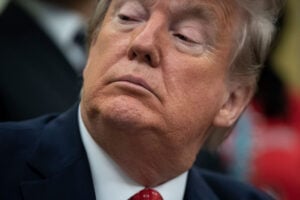
(Photo by Drew Angerer/Getty Images)
This past weekend, Donald Trump visited the Trump National Golf Club in Bedminster, New Jersey, marking his 285th documented visit to a golf course during his term as president. The White House stays fairly quiet about what Trump’s actually doing at all these trips to the golf course, given how much he excoriated his predecessor for playing golf (Obama played an estimated 333 rounds of golf over the eight years of his term, compared to Trump’s 285 often multiday visits to various golf courses during his first three-and-a-half years).
We do know that Trump spent some of his time at his New Jersey club speaking to his golf cronies, all of whom reportedly paid a six-figure initiation fee for the right to be there. While social distancing and other COVID-19 preventative measures did not seem to be prioritized among the crowd of more than 100 gathered at the golf club on Friday, when reporters asked whether any of the assembled Trump fans had been tested for coronavirus before coming to see Trump speak, no one in the crowd responded.
Every litigator knows that when a witness is nonresponsive to the question, it’s almost as good as a direct admission. Given the rigorous coronavirus testing that everyone even remotely close to Trump’s inner circle is consistently subjected to, it would be a deviation from protocol if the White House hadn’t required some kind of testing among attendees in advance of the relatively intimate event. People from Trump’s national security advisor down to a cafeteria worker at two eateries frequented by West Wing staffers have tested positive for COVID-19, as a result of the frequent tests performed on everyone the president might have contact with, and on the people they might have contact with.
But, while Trump sure seems to think it is a good idea for those around him to get repeatedly tested for coronavirus, he sure doesn’t seem to think it is a good idea for anyone around you to get tested. The White House sought to block billions of dollars in funding for COVID-19 testing and contact tracing in any new economic stimulus bill, and Trump himself has repeatedly claimed that the United States is doing too much testing.
“I said to my people, ‘Slow the testing down please,’” Trump said at a campaign rally in June. He later said that this comment was “semi-tongue in cheek,” which it wasn’t. Trump went on to say, at pretty much every chance he’s had since June, that we are doing too much testing, and we wouldn’t have so many coronavirus cases if we weren’t doing so much testing.
Most recently, Trump has downplayed the seriousness of children getting sick from the virus, and urged schools to reopen for in-person instruction in the fall. This is despite there being no comprehensive structure in place for testing or contact tracing in schools, despite a study that found nearly 100,000 U.S. children were infected with coronavirus in just the last two weeks of July, and despite evidence that children carry high amounts of the virus once infected and could serve as significant spreaders of the disease when placed within the confines of a classroom environment.
A few weeks ago, my girlfriend called the local clinic to ask about getting a coronavirus test. She was told it would take a week to schedule the appointment for the test, and then another week after that to get her results. The CDC says you can be around others 10 days after first having symptoms, as long as symptoms have abated, or 10 days after a positive COVID-19 test if you have no symptoms. Meaning a test result that takes 14 days to get is essentially useless. These sorts of testing delays seem to be fairly widespread.
Trump keeps saying that we don’t need to be testing as much as we are and that more and better coronavirus testing is not necessary to proceed with reopening schools and businesses. But actions speak louder than words. Trump’s political cronies get quickly and constantly tested. For the rest of us though, Trump thinks a test result two weeks out (when it’s too late to be of much use to us or our loved ones), or maybe even no test at all, is good enough.
Jonathan Wolf is a litigation associate at a midsize, full-service Minnesota firm. He also teaches as an adjunct writing professor at Mitchell Hamline School of Law, has written for a wide variety of publications, and makes it both his business and his pleasure to be financially and scientifically literate. Any views he expresses are probably pure gold, but are nonetheless solely his own and should not be attributed to any organization with which he is affiliated. He wouldn’t want to share the credit anyway. He can be reached at jon_wolf@hotmail.com.

